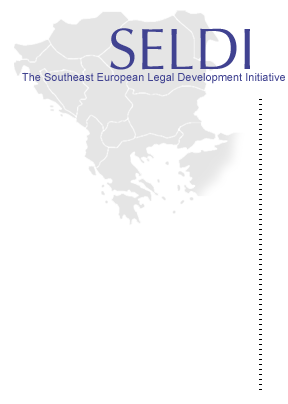

Focus Areas
Anti-Corruption/Good Governance
The success of the democratization and the establishment of a functioning region of Southeast Europe will depend on the existence of functioning institutions of pluralistic democracy and market economy in all the countries concerned. The effectiveness of local reform efforts and international technical and financial assistance requires the quality of public service and must be based on the best practices of good governance. SELDI’s activities in promoting these practices focus in two main areas:
-
Facilitating public-private partnerships in anti-corruption; and
-
Capacity building for the NGO sector as a factor for civic participation and accountability.
Regional anti-corruption efforts
As corruption is the negation of the Rule of Law and an impediment to efficient law enforcement and effective functioning of public institutions, non-governmental institutions need to find a common platform with the institutions of the state to work to prevent it. Reducing corruption requires not only the relevant institution-building measures but also creating the social preconditions for establishing the Rule of Law. In this context it is of decisive importance to foster a democratic political culture based on trust and respect of government institutions, transparency and openness of the activities of the administration, and an orientation towards stability and predictability. This task has become all the more pressing in the aftermath of the conflict in Kosovo whereby these issues have been effectively regionalized. Therefore, in the political environment of SEE where common formal institutions are yet to emerge, the innovative approach of Coalition 2000 consisting not in joining the stakeholders in formal organizations but rather implementing it as an open and transparent process, is particularly relevant. Not only do corruption pressures have certain cross-country roots in SEE (e.g. international criminal activities, migration, etc) but anti-corruption efforts, especially those aimed at promoting democratic values, could be implemented more efficiently in multilateral co-operation.
On the basis of the history of reforms in the region, it could be summarized that reform efforts will not succeed unless both governments and NGOs participate actively in the design and implementation of a common reform agenda. This is especially valid in areas such as the provision of public services and citizens’ rights. Corruption, therefore, should be a priority area where public-private co-operation needs to be established.
In this context, SELDI's regional anti-corruption initiatives will focus on coalition building and corruption monitoring. These efforts seek to strengthen the role of civil society organizations in establishing partnerships with public institutions for the implementation of anti-corruption measures on a regional scale. In addition, a network of organizations will be established within SELDI to monitor the level and scope of corruption in the region based on the Coalition 2000 monitoring methodology on a regional scale.
More:
Summary of Program for 2000-2003
Anti-Corruption/Good Governance
Strengthening of the Judiciary
WTO and Trade Development in the Region
Distance Learning Center